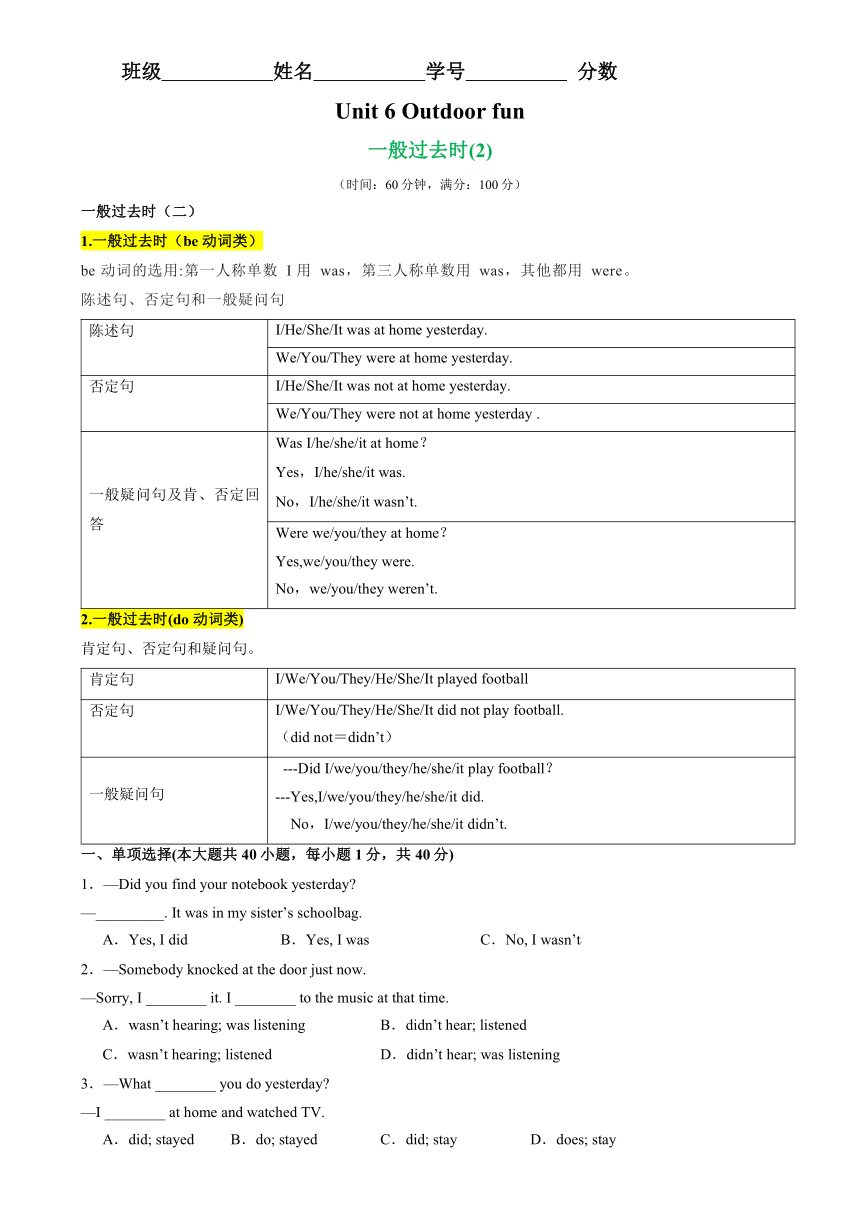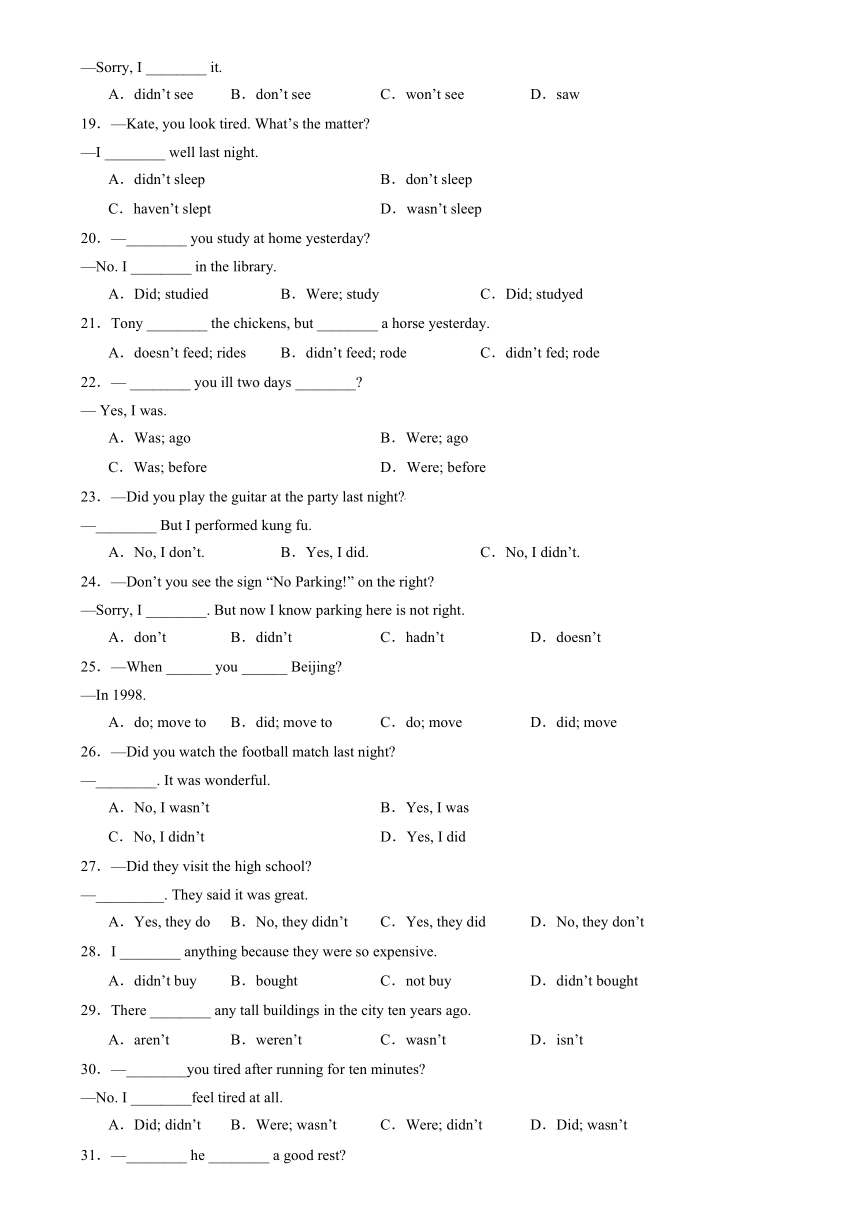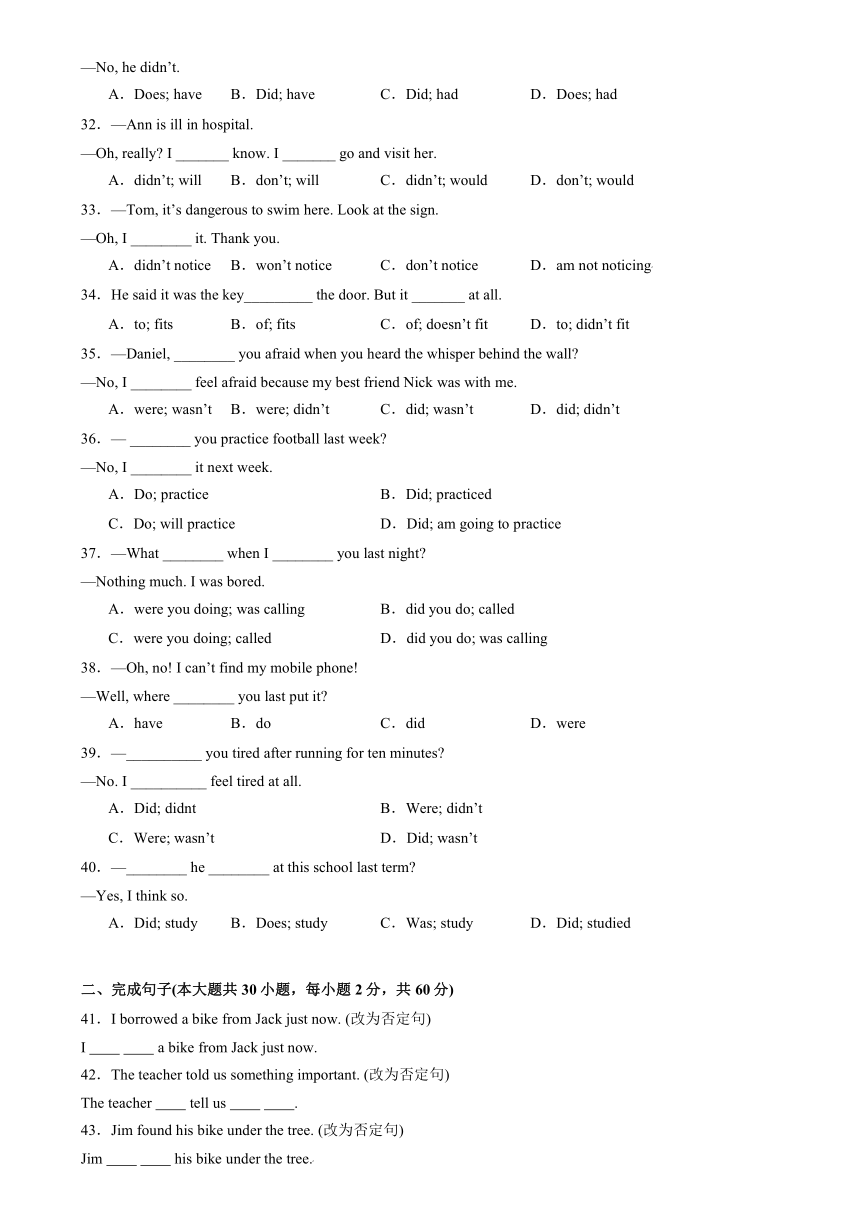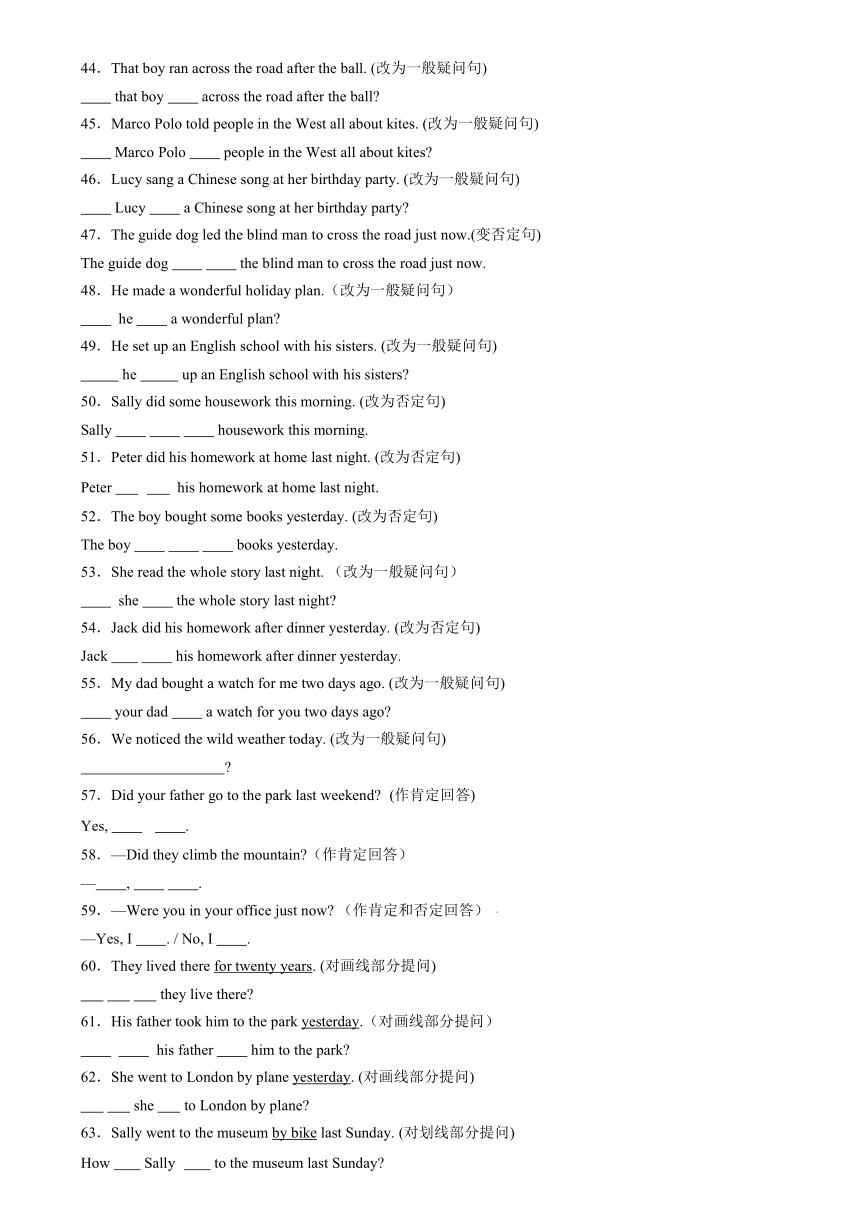Unit 6 Outdoor fun 语法Grammar 一般过去时(2) 练习(含解析)
文档属性
| 名称 | Unit 6 Outdoor fun 语法Grammar 一般过去时(2) 练习(含解析) |  | |
| 格式 | docx | ||
| 文件大小 | 49.5KB | ||
| 资源类型 | 教案 | ||
| 版本资源 | 牛津译林版 | ||
| 科目 | 英语 | ||
| 更新时间 | 2024-04-25 22:43:11 | ||
图片预览





文档简介
班级 姓名 学号 分数
Unit 6 Outdoor fun
一般过去时(2)
(时间:60分钟,满分:100分)
一般过去时(二)
1.一般过去时(be 动词类)
be 动词的选用:第一人称单数 I 用 was,第三人称单数用 was,其他都用 were。
陈述句、否定句和一般疑问句
陈述句 I/He/She/It was at home yesterday.
We/You/They were at home yesterday.
否定句 I/He/She/It was not at home yesterday.
We/You/They were not at home yesterday .
一般疑问句及肯、否定回答 Was I/he/she/it at home? Yes,I/he/she/it was. No,I/he/she/it wasn’t.
Were we/you/they at home? Yes,we/you/they were. No,we/you/they weren’t.
2.一般过去时(do 动词类)
肯定句、否定句和疑问句。
肯定句 I/We/You/They/He/She/It played football
否定句 I/We/You/They/He/She/It did not play football. (did not=didn’t)
一般疑问句 ---Did I/we/you/they/he/she/it play football? ---Yes,I/we/you/they/he/she/it did. No,I/we/you/they/he/she/it didn’t.
一、单项选择(本大题共40小题,每小题1分,共40分)
1.—Did you find your notebook yesterday
—_________. It was in my sister’s schoolbag.
A.Yes, I did B.Yes, I was C.No, I wasn’t
2.—Somebody knocked at the door just now.
—Sorry, I ________ it. I ________ to the music at that time.
A.wasn’t hearing; was listening B.didn’t hear; listened
C.wasn’t hearing; listened D.didn’t hear; was listening
3.—What ________ you do yesterday
—I ________ at home and watched TV.
A.did; stayed B.do; stayed C.did; stay D.does; stay
4.—When ________ Helen ________ to Korea
—Yesterday.
A.does; get B.did; get C.does; got D.did; got
5.—What ________ you ________ on the plane 2 hours ago
—I ________ 2 Japanese cry on the plane.
A.did saw, saw B.were see, saw C.did see, see D.did see, saw
6.—________ you ________ the training for volunteers last Sunday
—No. I went to a lecture by a famous scientist.
A.Do; join B.Did; joined C.Did; join
7.________ you a student last year
A.Are B.Was C.Were D.Do
8.— Look at the sign there! It ________ “No fishing!”
— Sorry, I __________ notice it.
A.said; don’t B.said; didn’t C.says; didn’t D.says; don’t
9.Mike ________ enjoy swimming. But now he goes swimming every week.
A.used to B.didn’t use to C.doesn’t use to D.uses to
10.How ________ your uncle ________ to work last year
A.do; go B.did; get C.does; get D.does; gets
11.— Look at my new smart phone.
— Wow, so cool! Where ________ you ________ it
A.do ... buy B.does ... buy C.did ... buy
12.—When ________ you ________ the new watch
—The day before yesterday.
A.do; bought B.did; buy C.did; bought
13.—Excuse me, what time ________ the concert ________
—Well, in fact you’re late. It ________ 20 minutes ago.
did...begin; began B.does...begin; began
C.did…begin; begins D.does...begin; begins
14.—What ________ you ________ during the weekend
—I went for a walk.
A.did; do B.do; do C.will; do D.is; doing
15.________ he ________ basketball this morning
A.Was, play B.Was, played C.Did, play D.Did, played
16.He _______ his homework. He ________ to the library instead.
A.didn’t do; went B.didn’t did; goes C.didn’t do; go D.did not; went
17.—Where ________ you________
—I went to the market to buy some food for supper.
A.do; go B.were; go C.did; go D.was; go
18.—Excuse me, look at the sign over there, please. Could you stop smoking
—Sorry, I ________ it.
A.didn’t see B.don’t see C.won’t see D.saw
19.—Kate, you look tired. What’s the matter
—I ________ well last night.
A.didn’t sleep B.don’t sleep
C.haven’t slept D.wasn’t sleep
20.—________ you study at home yesterday
—No. I ________ in the library.
A.Did; studied B.Were; study C.Did; studyed
21.Tony ________ the chickens, but ________ a horse yesterday.
A.doesn’t feed; rides B.didn’t feed; rode C.didn’t fed; rode
22.— ________ you ill two days ________
— Yes, I was.
A.Was; ago B.Were; ago
C.Was; before D.Were; before
23.—Did you play the guitar at the party last night
—________ But I performed kung fu.
A.No, I don’t. B.Yes, I did. C.No, I didn’t.
24.—Don’t you see the sign “No Parking!” on the right
—Sorry, I ________. But now I know parking here is not right.
A.don’t B.didn’t C.hadn’t D.doesn’t
25.—When ______ you ______ Beijing
—In 1998.
A.do; move to B.did; move to C.do; move D.did; move
26.—Did you watch the football match last night
—________. It was wonderful.
A.No, I wasn’t B.Yes, I was
C.No, I didn’t D.Yes, I did
27.—Did they visit the high school
—_________. They said it was great.
A.Yes, they do B.No, they didn’t C.Yes, they did D.No, they don’t
28.I ________ anything because they were so expensive.
A.didn’t buy B.bought C.not buy D.didn’t bought
29.There ________ any tall buildings in the city ten years ago.
A.aren’t B.weren’t C.wasn’t D.isn’t
30.—________you tired after running for ten minutes
—No. I ________feel tired at all.
A.Did; didn’t B.Were; wasn’t C.Were; didn’t D.Did; wasn’t
31.—________ he ________ a good rest
—No, he didn’t.
A.Does; have B.Did; have C.Did; had D.Does; had
32.—Ann is ill in hospital.
—Oh, really I _______ know. I _______ go and visit her.
A.didn’t; will B.don’t; will C.didn’t; would D.don’t; would
33.—Tom, it’s dangerous to swim here. Look at the sign.
—Oh, I ________ it. Thank you.
A.didn’t notice B.won’t notice C.don’t notice D.am not noticing
34.He said it was the key_________ the door. But it _______ at all.
A.to; fits B.of; fits C.of; doesn’t fit D.to; didn’t fit
35.—Daniel, ________ you afraid when you heard the whisper behind the wall
—No, I ________ feel afraid because my best friend Nick was with me.
A.were; wasn’t B.were; didn’t C.did; wasn’t D.did; didn’t
36.— ________ you practice football last week
—No, I ________ it next week.
A.Do; practice B.Did; practiced
C.Do; will practice D.Did; am going to practice
37.—What ________ when I ________ you last night
—Nothing much. I was bored.
A.were you doing; was calling B.did you do; called
C.were you doing; called D.did you do; was calling
38.—Oh, no! I can’t find my mobile phone!
—Well, where ________ you last put it
A.have B.do C.did D.were
39.—__________ you tired after running for ten minutes
—No. I __________ feel tired at all.
A.Did; didnt B.Were; didn’t
C.Were; wasn’t D.Did; wasn’t
40.—________ he ________ at this school last term
—Yes, I think so.
A.Did; study B.Does; study C.Was; study D.Did; studied
二、完成句子(本大题共30小题,每小题2分,共60分)
41.I borrowed a bike from Jack just now. (改为否定句)
I a bike from Jack just now.
42.The teacher told us something important. (改为否定句)
The teacher tell us .
43.Jim found his bike under the tree. (改为否定句)
Jim his bike under the tree.
44.That boy ran across the road after the ball. (改为一般疑问句)
that boy across the road after the ball
45.Marco Polo told people in the West all about kites. (改为一般疑问句)
Marco Polo people in the West all about kites
46.Lucy sang a Chinese song at her birthday party. (改为一般疑问句)
Lucy a Chinese song at her birthday party
47.The guide dog led the blind man to cross the road just now.(变否定句)
The guide dog the blind man to cross the road just now.
48.He made a wonderful holiday plan.(改为一般疑问句)
he a wonderful plan
49.He set up an English school with his sisters. (改为一般疑问句)
he up an English school with his sisters
50.Sally did some housework this morning. (改为否定句)
Sally housework this morning.
51.Peter did his homework at home last night. (改为否定句)
Peter his homework at home last night.
52.The boy bought some books yesterday. (改为否定句)
The boy books yesterday.
53.She read the whole story last night. (改为一般疑问句)
she the whole story last night
54.Jack did his homework after dinner yesterday. (改为否定句)
Jack his homework after dinner yesterday.
55.My dad bought a watch for me two days ago. (改为一般疑问句)
your dad a watch for you two days ago
56.We noticed the wild weather today. (改为一般疑问句)
57.Did your father go to the park last weekend (作肯定回答)
Yes, .
58.—Did they climb the mountain (作肯定回答)
— , .
59.—Were you in your office just now (作肯定和否定回答)
—Yes, I . / No, I .
60.They lived there for twenty years. (对画线部分提问)
they live there
61.His father took him to the park yesterday.(对画线部分提问)
his father him to the park
62.She went to London by plane yesterday. (对画线部分提问)
she to London by plane
63.Sally went to the museum by bike last Sunday. (对划线部分提问)
How Sally to the museum last Sunday
64.David put the round table near the kitchen. (对划线部分提问)
David put the round table
65.We played football in the playground the day before yesterday.(对画线部分提问)
you in the playground the day before yesterday
66.They took the little rabbit to the animal centre.(对画线部分提问)
they the little rabbit
67.Lin Tao stayed in hospital for two weeks.(对划线部分提问)
Lin Tao in hospital
68.Jenny sold her toys because she wanted to raise money. (划线部分提问)
Jenny sell her toys
69.The doctor went to work by BRT yesterday.(对画线部分提问)
How the doctor to work yesterday
70.Tony bought a present for his son’s birthday. (对划线部分提问)
Tony buy for his son’s birthday?
参考答案:
1.A
【详解】句意:——你昨天找到你的笔记本了吗? ——是的。它在我姐姐的书包里。
考查一般疑问句。根据“It was in my sister’s schoolbag.”可知,此处应用肯定回答,排除C;问句用Did提问,答语也用did回答。故选A。
2.D
【详解】句意:——刚才有人敲门。——对不起,我没有听到。那时我正在听音乐。
考查一般过去时和过去进行时。根据“—Somebody knocked at the door just now. —Sorry”可知,在刚才敲门时,我没有听到,陈述刚刚发生的事实,用一般过去时。根据时间状语“at that time在那时”可知,我那时正在听音乐。在过去某一时间正在发生的动作要用过去进行时。过去进行时的结构为:主语+was/were doing。故选D。
3.A
【详解】句意:——你昨天做了什么?——我待在家里看电视。
考查时态。根据“yesterday”可知,时态为一般过去时,空一应该用助动词did,空二应该用过去式。故选A。
4.B
【详解】句意:——海伦什么时候到韩国的?——昨天。
考查时态。根据“Yesterday”可知句子用一般过去时,变疑问句借助did,后加动词原形。故选B。
5.D
【详解】句意:——两小时前你在飞机上看到了什么?——我看到两个日本人在飞机上哭。
考查时态。根据“2 years ago”可知句子用一般过去时,且句中含有实义动词,变疑问句时借助助动词did,后加动词原形,排除AB;第二个句子用一般过去时,动词用过去式。故选D。
6.C
【详解】句意:——上周日你参加志愿者培训了吗?——没有。我去听了一位著名科学家的讲座。
考查动词时态及一般疑问句。根据“last Sunday”可知,时态为一般过去时,因此助动词用did,后跟动词原形。故选C。
7.C
【详解】句意:去年你是一名学生吗?
考查be动词以及时态。根据“you a student”可知句中缺少be动词;根据“last year”可知句子用一般过去时,主语是you,be动词用were。故选C。
8.C
【详解】句意:——看那边的标志!上面写着“禁止钓鱼!”——抱歉,我没有注意到它。
考查动词时态。第一空所在句子是陈述事实,用一般现在时。“没有注意到这个标志”是过去发生的动作,所以第二空应填过去式,故选C。
9.B
【详解】句意:迈克过去不喜欢游泳。但现在他每周都去游泳。
考查动词时态。used to do sth.“过去常做某事”,根据“But now he goes swimming every week.”可知,But表转折,指过去不喜欢游泳,但是现在喜欢游泳,此处应为否定句,时态是一般过去时,结构为didn’t use to do sth.。故选B。
10.B
【详解】句意:你叔叔去年是怎么上班的?
考查时态。根据“last year”可知句子用一般过去时,变疑问句借助助动词did,后加动词原形。故选B。
11.C
【详解】句意:——看我的新智能手机。——哇,太酷了!你在哪里买的它?
考查时态辨析。根据“Look at my new smart phone.”可知买的动作发生在过去,用一般过去时,特殊疑问句中助动词用did。故选C。
12.B
【详解】句意:——你什么时候买的这块新手表?——前天。
考查特殊疑问句和时态。根据答语“The day before yesterday.”,可知是前天买的,所以问句的时态为一般过去时,问句中的助动词用“did”,后接动词原形,故选B。
13.B
【详解】句意:——对不起,音乐会什么时候开始?——嗯,事实上你迟到了。20分钟前开始了。
考查时态。分析语境可知,提问者并不知道音乐会已经开始,单纯询问音乐会开始的时间,故问句不是一般过去时,排除AC。根据“20 minutes ago”可知,音乐会20分钟前开始了,答句用一般过去时。故选B。
14.A
【详解】句意:——你周末的时候做了什么?——我散步。
考查时态。根据“I went for a walk”可知句子用一般过去时,变疑问句时借助助动词did,后加动词原形。故选A。
15.C
【详解】他今天早上打篮球了吗?
考查一般疑问句。根据“this morning”可知,句子为一般过去时,动词为play,此处用助动词“Did”进行提问,其后跟动词原形。故选C。
16.A
【详解】句意:她没有做作业。她去了图书馆。
考查一般过去时。do one’s homework“做作业”,一般过去时的否定句借助于助动词didn’t,动词用原形,故第一空填didn’t do。根据“didn’t”可知,句子是一般过去时,故第二空填动词过去式went,故选A。
17.C
【详解】句意:——你去哪里了?——我去市场买了一些晚饭吃的食物。
考查时态。根据“I went to the market...”可知句子是含实义动词的一般过去时,疑问句的助动词用did。故选C。
18.A
【详解】句意:——打扰一下,请看那儿的标志。你能停止吸烟吗?——对不起,我没看到。
考查过去时态。didn’t see没看到(过去时态);don’t see没看到(一般现在时);won’t see将来时;saw看到(一般过去时)。根据语境可知,应是过去没看到。故选A。
19.A
【详解】句意:——凯特,你看起来很累。怎么了?——我昨晚没睡好。
考查谓语动词时态。根据“last night”可知是一般过去时,谓语动词需用过去式,sleep是动词,需用助动词didn’t构成否定。故选A。
20.A
【详解】句意:——你昨天在家学习吗?——不。我在图书馆学习。
考查一般疑问句及动词时态。根据“yesterday”可知,时态是一般过去时,句中含实义动词study,故在疑问句中将助动词did提至句首。第二空应用动词过去式studied。故选A。
21.B
【详解】句意:托尼昨天没有喂鸡而是骑马。
考查一般过去时态。根据“yesterday”可知,时态为一般过去时,否定句“didn’t+动词原形”,ride的过去式rode。故选B。
22.B
【详解】句意:——你两天前病了吗?——是的,我是。
考查一般过去时及副词辨析。ago立足于现在,表示从现在起,通常与一般过去时连用;before立足过去,表示从过去某一时刻起,通常与过去完成时连用。根据答语“Yes, I was.”可知,该句为一般过去时,主语为you,be动词用were,连接时间状语应为two days ago,故选B。
23.C
【详解】句意:——你昨晚在聚会上弹吉他了吗?——不,我没有。但我表演了功夫。
考查一般疑问句答语。根据“But I performed kung fu.”可知,此处为否定回答,又根据“last night”可知为一般过去时,故选C。
24.B
【详解】句意:——你没有看到右边的“禁止停车”的标志吗?——对不起,我没有看到。但是现在我知道在这儿停车是不对的了。
考查动词的时态辨析。本题表示“你告诉我之前,我没有看到。”表示过去,用一般过去时态。故选B。
25.B
【详解】句意:——你什么时候搬去北京的?——1998年。
考查动词时态和动词短语辨析。由答语中in 1998可知应用一般过去时态,故排除A、C两项;move后接“to+地点”表示“搬到某地”。故选B。
26.D
【详解】句意:——你昨晚看足球比赛了吗?——是的,我看了。它很精彩。
考查一般疑问句的回答。根据“Did you watch the football match last night ”可知,该句是含有助动词did,主语为you,故肯定回答应用Yes, I did.,否定回答用No, I didn’t.;再根据“It was wonderful.”可知,此处要进行肯定回答。故选D。
27.C
【详解】句意:——他们参观那所高中了吗?——是的,他们参观了。他们说学校很棒。
考查一般疑问句的回答。问句“Did they visit the high school ”时态是一般过去时,答语助动词用did,根据“They said it was great.”可知,能对学校进行评价说明已经参观过学校,答语
是肯定的,故选C。
28.A
【详解】句意:我什么都没买,因为太贵了。
考查否定句。根据“because they were so expensive.”可知,因为太贵了,所以没有买任何东西,句子用否定句,且时态为一般过去时,因此否定需借助助动词didn’t,后跟动词原形。故选A。
29.B
【详解】句意:十年前这个城市没有高楼。
考查谓语动词的时态和主谓一致。根据“ten years ago”可知,时态为一般过去时;又根据“any tall buildings”可知,be动词应用are,过去式为were。故选B。
30.C
【详解】句意:——你跑了十分钟后,累了吗?——不,我一点也不觉得累。
考查be动词和助动词。第一句是主系表结构(be动词+形容词),结合“you tired”可知是缺be动词,应用were;第二句含谓语动词feel,时态为一般过去时,否定句借助助动词didn’t。故选C。
31.B
【详解】句意:——他休息好了吗?——不,他没有。
考查一般过去时。does一般现在时的助动词;have有,动词原形;did一般过去时的助动词;had动词过去式。根据答句“No, he didn’t.”可知应是一般过去时,一般疑问句需要将助动词did提前,后面的动词用动词原形。故选B。
32.A
【详解】句意:——安生病住院了。——真的吗?我都不知道,我会去看她的。
考查一般过去时与一般将来时的用法。根据“I...know.”可知,不知道安住院了,是过去的事情,所以第一空用一般过去时,可排除BD选项;空二表示要去看她,发生在将来,用一般将来时will do来表示。故选A。
33.A
【详解】句意:——Tom在这里游泳太危险了。快看那个标志。——我刚刚没看到。谢谢你。
考查一般过去时。didn’t notice一般过去时;won’t notice将来时;don’t notice一般现在时;am not noticing现在进行时。根据语境应是过去没看见,所以使用一般过去时。故选A。
34.D
【详解】句意:他说这是这扇门的钥匙。但是它并不匹配。
考查介词辨析及一般过去时的否定。此处考查固定短语the key to...“……的钥匙”,用介词to,排除B、C选项;根据连词But“但是”可知,前后关系是转折关系,前一句说钥匙是这扇门的,后一句应表达钥匙和门不匹配,用一般过去时的否定结构didn’t do,排除A选项。故选D。
35.B
【详解】句意:——丹尼尔,当你听到墙后的窃窃私语时,你会害怕吗?——不,我不会感觉害怕因为我最好的朋友尼克和我在一起。
考查一般过去时的一般疑问句。根据“when you heard the whisper behind the wall”可知是一般过去时,又因为“…you afraid”可知要用were提问;根据“I…feel afraid”以及“No”可知第二个空要用didn’t来构成否定句。故选B。
36.D
【详解】句意:——上周你练习足球了吗?——不,我下周练习。
考查时态。问句中,根据“last week”可知过去发生的事,用一般过去时,助动词用did;回答中,根据“next week”可知,用一般将来时。故选D。
37.C
【详解】句意:——昨晚我给你打电话的时候你在干什么?——什么都没干。我很无聊。
考查时态。根据“What...when I...you last night ”可知,强调在过去的时间点,正在发生的动作,主句用过去进行时,从句用一般过去时。故选C。
38.C
【详解】句意:——哦,不!我不能找到我的手机了!——哦,你最后把它放在哪了?
考查一般过去时。have有,作助动词时用于现在完成时;do用于一般现在时;did用于一般过去时;were是,be动词的过去式。根据“I can’t find my mobile phone!”以及“last”可知用一般过去时态,句子的谓语动词是put,实义动词,变特殊疑问句时要借助助动词did。故选C。
39.B
【详解】句意:——你跑了十分钟,累了吗?——不,我一点也不觉得累。
考查be动词和助动词。were是(过去式、主语是复数);didn’t助动词的否定(一般过去时);did助动词(一般过去时);wasn’t是(过去式、主语是单数或不可数名词)。第一句是
主系表结构(be动词+形容词),结合“you tired”可知是缺be动词,应用were;第二句谓语动词“feel tired”是动词词组,时态为一般过去时,否定句借助助动词“didn’t”,故选B。
40.A
【详解】句意:——他上学期在这所学校学习吗?——是的,我认为如此。
考查一般疑问句。根据“last term”可知用一般过去时,谓语动词是实义动词study,主语前用助动词did。故选A。
41. didn’t borrow
【详解】句意:刚才我向杰克借了一辆自行车。我刚才没有向杰克借自行车。根据原句可知,时态为一般过去时,borrow“借”,实义动词,所以此句变成否定句,谓语部分需要借助助动词didn’t,后跟动词原形。故填didn’t;borrow。
42. didn’t anything important
【详解】句意:老师告诉我们一些重要的事情。原句谓语动词是过去式told,否定句用助动词didn’t,否定句中something改为anything。故填didn’t;anything;important。
43. didn’t find
【详解】句意:吉姆在树下发现了他的自行车。根据“found”可知句子是一般过去时,变否定句时借助助动词didn’t,后加动词原形find。故填didn’t;find。
44. Did run
【详解】句意:那个男孩追着球跑过马路。根据“ran”可知句子用一般过去时,变疑问句时借助助动词did,后加动词原形run。故填Did;run。
45. Did tell
【详解】句意:马可·波罗告诉西方人关于风筝的一切。分析题干,原句为一般过去时,谓语动词told为过去式,变一般疑问句时,应用助动词did引导,句首首字母应大写,谓语动词应用原形tell。故填Did;tell。
46. Did sing
【详解】句意:露西在她的生日聚会上唱了一首中文歌。原句谓语为实义动词过去式sang,改为一般疑问句时主语前借助助动词did,主语后用动词原形sing。句子开头首字母大写。故填Did;sing。
47. didn’t lead
【详解】句意:刚才导盲犬领着盲人过马路。根据“just now”可知,时态是一般过去时,改为否定句,将助动词didn’t提前,谓语动词led改为其原形。故填didn’t;lead。
48. Did make
【详解】句意:他制定了一个很棒的假期计划。该句为一般过去时,且带有实义动词,变一般疑问句时,在句首加Did,动词过去式made变回原形make,故填Did;make。
49. Did set
【详解】句意:他和他的姐妹们创办了一所英语学校。set在这里是动词过去式,一般疑问句借助于助动词did,后面的动词用原形set,故填Did;set。
50. didn’t do any
【详解】句意:Sally今天早上做了一些家务。结合题干可知,原句时态为一般过去时,原句的谓语动词为did,改为否定句时,谓语动词did前应用否定助动词didn’t,此时谓语动词用原形do,且some要改为any。故填didn’t;do;any。
51. didn’t do
【详解】句意:皮特昨晚上做了家庭作业。考查肯定句变否定句。原句是一般过去时,改成一般过去时的否定句,其结构为:主语+didn’t+动词原形+其他。did的原形是do。故填didn’t;do。
52. didn’t buy any
【详解】句意:这个男孩昨天买了一些书。原句时态为一般过去时,且含有实义动词“bought”,故改为否定句应用助动词didn’t,后接动词原形buy;原句的some改为any。故填didn’t;buy;any。
53. Did read
【详解】句意:她昨晚看了整个故事。原句是一般过去时,变为一般疑问句,需要借助助动词did,位于句首,后面用动词原形read,故填Did;read。
54. didn’t do
【详解】句意:杰克昨天晚饭后做了家庭作业。原句是一般过去时,变为否定句时,需要用助动词didn’t,后加动词原形do。故填didn’t;do。
55. Did buy
【详解】句意:我爸爸两天前给我买了一块手表。原句时态为一般过去时,谓语动词是“bought”,变一般疑问句需借助助动词did,置于句首,过去式bought变为原形buy。故填Did;buy。
56.Did you notice the wild weather today
【详解】句意:我们注意到今天的恶劣天气。分析句子可知,原句为一般过去时的陈述句且含有实义动词,变一般疑问句时要借助助动词did,后用动词原形,用在句首开头字母大写;第一人称we在变一般疑问句时要变为第二人称you。故填Did you notice the wild weather today。
57. he did
【详解】句意:你父亲上周末去公园了吗?一般疑问句中是含有助动词did,肯定回答为:Yes, sb. did,此处用主格代词he代替“your father”。故填he;did。
58. Yes they did
【详解】句意:——他们爬山了吗?——是的,他们爬山了。句子是含有助动词did的一般疑问句,其肯定回答为:Yes, 主语+did,句子主语是they“他们”。故填Yes;they;did。
59. was wasn’t
【详解】句意:——你刚才在办公室吗?——是的,我在。/不,我不在。本题是一般疑问句的回答,肯定回答是:Yes, 主语+be.否定回答是:No, 主语+be not.题空前主语是“I”,时态是一般过去时,因此be动词是was。故填was;wasn’t。
60. How long did
【详解】句意:他们在那里住了二十年。划线部分是一段时间,应用“how long”提问,句子为一般过去时,助动词借助did,句首开头字母大写。故填How;long;did。
61. When did take
【详解】句意:他父亲昨天带他去了公园。划线部分为时间,应用when提问,句首开头字母大写;句子为一般过去时,应借助助动词did,其后的动词用原形take。故填When;did;take。
62. When did go
【详解】句意:她昨天乘飞机去了伦敦。划线部分为时间,应用when提问,句首开头字母大写;句子为一般过去时,助动词借助did,其后用动词原形go。故填When;did;go。
63. did go
【详解】句意:Sally上星期天骑自行车去了博物馆。由“last Sunday”可知,时态为一般过去时,助动词应用did,放在主语前;went用原形go。故填did;go。
64. Where did
【详解】句意:大卫把圆桌放在厨房附近。划线部分是位置,应用where提问。原句是一般过去时,疑问句需要借助助动词did。故填Where;did。
65. What did do
【详解】句意:前天我们在操场上踢足球。根据“played football”可知,提问动作用what,句中含有实义动词played,所以变为疑问句用助动词用did,要放在主语前,动词用do代替。故填What;did;do。
66. Where did take
【详解】句意:他们把小兔子带到动物中心。划线部分是地点,对其提问应用疑问词where“在哪里”;原句是一般过去时,疑问句需借助助动词did,动词用原形,故填Where;did;take。
67. How long did stay
【详解】句意:林涛住院已经两个星期了。划线部分for two weeks表示时长,应用how long来提问,位于句首,首字母要大写,原句中的“stayed”说明句子采用一般过去时,在疑问句中,应借助助动词did,后加动词原形。故填How;long;did;stay。
68. Why did
【详解】句意:珍妮卖掉了她的玩具,因为她想筹集资金。划线部分表示原因,用why提问,原句谓语动词是过去式sold,此处将助动词did提到主语前。故填Why;did。
69. did go
【详解】句意:这个医生昨天乘快速公交去上班。根据划线部分可知,是提问交通方式,用疑问词how,其后跟一般疑问句,该句为一般过去时,变一般疑问句时用助动词did,句中动词过去式went变回原形go,故填did;go。
70. What did
【详解】句意:托尼为他儿子的生日买了一件礼物。划线部分表示具体的东西,所以此处用what进行提问;原句中动词为bought,所以变成疑问句时要使用助动词did,并将bought变成原形buy。故填What;did。
Unit 6 Outdoor fun
一般过去时(2)
(时间:60分钟,满分:100分)
一般过去时(二)
1.一般过去时(be 动词类)
be 动词的选用:第一人称单数 I 用 was,第三人称单数用 was,其他都用 were。
陈述句、否定句和一般疑问句
陈述句 I/He/She/It was at home yesterday.
We/You/They were at home yesterday.
否定句 I/He/She/It was not at home yesterday.
We/You/They were not at home yesterday .
一般疑问句及肯、否定回答 Was I/he/she/it at home? Yes,I/he/she/it was. No,I/he/she/it wasn’t.
Were we/you/they at home? Yes,we/you/they were. No,we/you/they weren’t.
2.一般过去时(do 动词类)
肯定句、否定句和疑问句。
肯定句 I/We/You/They/He/She/It played football
否定句 I/We/You/They/He/She/It did not play football. (did not=didn’t)
一般疑问句 ---Did I/we/you/they/he/she/it play football? ---Yes,I/we/you/they/he/she/it did. No,I/we/you/they/he/she/it didn’t.
一、单项选择(本大题共40小题,每小题1分,共40分)
1.—Did you find your notebook yesterday
—_________. It was in my sister’s schoolbag.
A.Yes, I did B.Yes, I was C.No, I wasn’t
2.—Somebody knocked at the door just now.
—Sorry, I ________ it. I ________ to the music at that time.
A.wasn’t hearing; was listening B.didn’t hear; listened
C.wasn’t hearing; listened D.didn’t hear; was listening
3.—What ________ you do yesterday
—I ________ at home and watched TV.
A.did; stayed B.do; stayed C.did; stay D.does; stay
4.—When ________ Helen ________ to Korea
—Yesterday.
A.does; get B.did; get C.does; got D.did; got
5.—What ________ you ________ on the plane 2 hours ago
—I ________ 2 Japanese cry on the plane.
A.did saw, saw B.were see, saw C.did see, see D.did see, saw
6.—________ you ________ the training for volunteers last Sunday
—No. I went to a lecture by a famous scientist.
A.Do; join B.Did; joined C.Did; join
7.________ you a student last year
A.Are B.Was C.Were D.Do
8.— Look at the sign there! It ________ “No fishing!”
— Sorry, I __________ notice it.
A.said; don’t B.said; didn’t C.says; didn’t D.says; don’t
9.Mike ________ enjoy swimming. But now he goes swimming every week.
A.used to B.didn’t use to C.doesn’t use to D.uses to
10.How ________ your uncle ________ to work last year
A.do; go B.did; get C.does; get D.does; gets
11.— Look at my new smart phone.
— Wow, so cool! Where ________ you ________ it
A.do ... buy B.does ... buy C.did ... buy
12.—When ________ you ________ the new watch
—The day before yesterday.
A.do; bought B.did; buy C.did; bought
13.—Excuse me, what time ________ the concert ________
—Well, in fact you’re late. It ________ 20 minutes ago.
did...begin; began B.does...begin; began
C.did…begin; begins D.does...begin; begins
14.—What ________ you ________ during the weekend
—I went for a walk.
A.did; do B.do; do C.will; do D.is; doing
15.________ he ________ basketball this morning
A.Was, play B.Was, played C.Did, play D.Did, played
16.He _______ his homework. He ________ to the library instead.
A.didn’t do; went B.didn’t did; goes C.didn’t do; go D.did not; went
17.—Where ________ you________
—I went to the market to buy some food for supper.
A.do; go B.were; go C.did; go D.was; go
18.—Excuse me, look at the sign over there, please. Could you stop smoking
—Sorry, I ________ it.
A.didn’t see B.don’t see C.won’t see D.saw
19.—Kate, you look tired. What’s the matter
—I ________ well last night.
A.didn’t sleep B.don’t sleep
C.haven’t slept D.wasn’t sleep
20.—________ you study at home yesterday
—No. I ________ in the library.
A.Did; studied B.Were; study C.Did; studyed
21.Tony ________ the chickens, but ________ a horse yesterday.
A.doesn’t feed; rides B.didn’t feed; rode C.didn’t fed; rode
22.— ________ you ill two days ________
— Yes, I was.
A.Was; ago B.Were; ago
C.Was; before D.Were; before
23.—Did you play the guitar at the party last night
—________ But I performed kung fu.
A.No, I don’t. B.Yes, I did. C.No, I didn’t.
24.—Don’t you see the sign “No Parking!” on the right
—Sorry, I ________. But now I know parking here is not right.
A.don’t B.didn’t C.hadn’t D.doesn’t
25.—When ______ you ______ Beijing
—In 1998.
A.do; move to B.did; move to C.do; move D.did; move
26.—Did you watch the football match last night
—________. It was wonderful.
A.No, I wasn’t B.Yes, I was
C.No, I didn’t D.Yes, I did
27.—Did they visit the high school
—_________. They said it was great.
A.Yes, they do B.No, they didn’t C.Yes, they did D.No, they don’t
28.I ________ anything because they were so expensive.
A.didn’t buy B.bought C.not buy D.didn’t bought
29.There ________ any tall buildings in the city ten years ago.
A.aren’t B.weren’t C.wasn’t D.isn’t
30.—________you tired after running for ten minutes
—No. I ________feel tired at all.
A.Did; didn’t B.Were; wasn’t C.Were; didn’t D.Did; wasn’t
31.—________ he ________ a good rest
—No, he didn’t.
A.Does; have B.Did; have C.Did; had D.Does; had
32.—Ann is ill in hospital.
—Oh, really I _______ know. I _______ go and visit her.
A.didn’t; will B.don’t; will C.didn’t; would D.don’t; would
33.—Tom, it’s dangerous to swim here. Look at the sign.
—Oh, I ________ it. Thank you.
A.didn’t notice B.won’t notice C.don’t notice D.am not noticing
34.He said it was the key_________ the door. But it _______ at all.
A.to; fits B.of; fits C.of; doesn’t fit D.to; didn’t fit
35.—Daniel, ________ you afraid when you heard the whisper behind the wall
—No, I ________ feel afraid because my best friend Nick was with me.
A.were; wasn’t B.were; didn’t C.did; wasn’t D.did; didn’t
36.— ________ you practice football last week
—No, I ________ it next week.
A.Do; practice B.Did; practiced
C.Do; will practice D.Did; am going to practice
37.—What ________ when I ________ you last night
—Nothing much. I was bored.
A.were you doing; was calling B.did you do; called
C.were you doing; called D.did you do; was calling
38.—Oh, no! I can’t find my mobile phone!
—Well, where ________ you last put it
A.have B.do C.did D.were
39.—__________ you tired after running for ten minutes
—No. I __________ feel tired at all.
A.Did; didnt B.Were; didn’t
C.Were; wasn’t D.Did; wasn’t
40.—________ he ________ at this school last term
—Yes, I think so.
A.Did; study B.Does; study C.Was; study D.Did; studied
二、完成句子(本大题共30小题,每小题2分,共60分)
41.I borrowed a bike from Jack just now. (改为否定句)
I a bike from Jack just now.
42.The teacher told us something important. (改为否定句)
The teacher tell us .
43.Jim found his bike under the tree. (改为否定句)
Jim his bike under the tree.
44.That boy ran across the road after the ball. (改为一般疑问句)
that boy across the road after the ball
45.Marco Polo told people in the West all about kites. (改为一般疑问句)
Marco Polo people in the West all about kites
46.Lucy sang a Chinese song at her birthday party. (改为一般疑问句)
Lucy a Chinese song at her birthday party
47.The guide dog led the blind man to cross the road just now.(变否定句)
The guide dog the blind man to cross the road just now.
48.He made a wonderful holiday plan.(改为一般疑问句)
he a wonderful plan
49.He set up an English school with his sisters. (改为一般疑问句)
he up an English school with his sisters
50.Sally did some housework this morning. (改为否定句)
Sally housework this morning.
51.Peter did his homework at home last night. (改为否定句)
Peter his homework at home last night.
52.The boy bought some books yesterday. (改为否定句)
The boy books yesterday.
53.She read the whole story last night. (改为一般疑问句)
she the whole story last night
54.Jack did his homework after dinner yesterday. (改为否定句)
Jack his homework after dinner yesterday.
55.My dad bought a watch for me two days ago. (改为一般疑问句)
your dad a watch for you two days ago
56.We noticed the wild weather today. (改为一般疑问句)
57.Did your father go to the park last weekend (作肯定回答)
Yes, .
58.—Did they climb the mountain (作肯定回答)
— , .
59.—Were you in your office just now (作肯定和否定回答)
—Yes, I . / No, I .
60.They lived there for twenty years. (对画线部分提问)
they live there
61.His father took him to the park yesterday.(对画线部分提问)
his father him to the park
62.She went to London by plane yesterday. (对画线部分提问)
she to London by plane
63.Sally went to the museum by bike last Sunday. (对划线部分提问)
How Sally to the museum last Sunday
64.David put the round table near the kitchen. (对划线部分提问)
David put the round table
65.We played football in the playground the day before yesterday.(对画线部分提问)
you in the playground the day before yesterday
66.They took the little rabbit to the animal centre.(对画线部分提问)
they the little rabbit
67.Lin Tao stayed in hospital for two weeks.(对划线部分提问)
Lin Tao in hospital
68.Jenny sold her toys because she wanted to raise money. (划线部分提问)
Jenny sell her toys
69.The doctor went to work by BRT yesterday.(对画线部分提问)
How the doctor to work yesterday
70.Tony bought a present for his son’s birthday. (对划线部分提问)
Tony buy for his son’s birthday?
参考答案:
1.A
【详解】句意:——你昨天找到你的笔记本了吗? ——是的。它在我姐姐的书包里。
考查一般疑问句。根据“It was in my sister’s schoolbag.”可知,此处应用肯定回答,排除C;问句用Did提问,答语也用did回答。故选A。
2.D
【详解】句意:——刚才有人敲门。——对不起,我没有听到。那时我正在听音乐。
考查一般过去时和过去进行时。根据“—Somebody knocked at the door just now. —Sorry”可知,在刚才敲门时,我没有听到,陈述刚刚发生的事实,用一般过去时。根据时间状语“at that time在那时”可知,我那时正在听音乐。在过去某一时间正在发生的动作要用过去进行时。过去进行时的结构为:主语+was/were doing。故选D。
3.A
【详解】句意:——你昨天做了什么?——我待在家里看电视。
考查时态。根据“yesterday”可知,时态为一般过去时,空一应该用助动词did,空二应该用过去式。故选A。
4.B
【详解】句意:——海伦什么时候到韩国的?——昨天。
考查时态。根据“Yesterday”可知句子用一般过去时,变疑问句借助did,后加动词原形。故选B。
5.D
【详解】句意:——两小时前你在飞机上看到了什么?——我看到两个日本人在飞机上哭。
考查时态。根据“2 years ago”可知句子用一般过去时,且句中含有实义动词,变疑问句时借助助动词did,后加动词原形,排除AB;第二个句子用一般过去时,动词用过去式。故选D。
6.C
【详解】句意:——上周日你参加志愿者培训了吗?——没有。我去听了一位著名科学家的讲座。
考查动词时态及一般疑问句。根据“last Sunday”可知,时态为一般过去时,因此助动词用did,后跟动词原形。故选C。
7.C
【详解】句意:去年你是一名学生吗?
考查be动词以及时态。根据“you a student”可知句中缺少be动词;根据“last year”可知句子用一般过去时,主语是you,be动词用were。故选C。
8.C
【详解】句意:——看那边的标志!上面写着“禁止钓鱼!”——抱歉,我没有注意到它。
考查动词时态。第一空所在句子是陈述事实,用一般现在时。“没有注意到这个标志”是过去发生的动作,所以第二空应填过去式,故选C。
9.B
【详解】句意:迈克过去不喜欢游泳。但现在他每周都去游泳。
考查动词时态。used to do sth.“过去常做某事”,根据“But now he goes swimming every week.”可知,But表转折,指过去不喜欢游泳,但是现在喜欢游泳,此处应为否定句,时态是一般过去时,结构为didn’t use to do sth.。故选B。
10.B
【详解】句意:你叔叔去年是怎么上班的?
考查时态。根据“last year”可知句子用一般过去时,变疑问句借助助动词did,后加动词原形。故选B。
11.C
【详解】句意:——看我的新智能手机。——哇,太酷了!你在哪里买的它?
考查时态辨析。根据“Look at my new smart phone.”可知买的动作发生在过去,用一般过去时,特殊疑问句中助动词用did。故选C。
12.B
【详解】句意:——你什么时候买的这块新手表?——前天。
考查特殊疑问句和时态。根据答语“The day before yesterday.”,可知是前天买的,所以问句的时态为一般过去时,问句中的助动词用“did”,后接动词原形,故选B。
13.B
【详解】句意:——对不起,音乐会什么时候开始?——嗯,事实上你迟到了。20分钟前开始了。
考查时态。分析语境可知,提问者并不知道音乐会已经开始,单纯询问音乐会开始的时间,故问句不是一般过去时,排除AC。根据“20 minutes ago”可知,音乐会20分钟前开始了,答句用一般过去时。故选B。
14.A
【详解】句意:——你周末的时候做了什么?——我散步。
考查时态。根据“I went for a walk”可知句子用一般过去时,变疑问句时借助助动词did,后加动词原形。故选A。
15.C
【详解】他今天早上打篮球了吗?
考查一般疑问句。根据“this morning”可知,句子为一般过去时,动词为play,此处用助动词“Did”进行提问,其后跟动词原形。故选C。
16.A
【详解】句意:她没有做作业。她去了图书馆。
考查一般过去时。do one’s homework“做作业”,一般过去时的否定句借助于助动词didn’t,动词用原形,故第一空填didn’t do。根据“didn’t”可知,句子是一般过去时,故第二空填动词过去式went,故选A。
17.C
【详解】句意:——你去哪里了?——我去市场买了一些晚饭吃的食物。
考查时态。根据“I went to the market...”可知句子是含实义动词的一般过去时,疑问句的助动词用did。故选C。
18.A
【详解】句意:——打扰一下,请看那儿的标志。你能停止吸烟吗?——对不起,我没看到。
考查过去时态。didn’t see没看到(过去时态);don’t see没看到(一般现在时);won’t see将来时;saw看到(一般过去时)。根据语境可知,应是过去没看到。故选A。
19.A
【详解】句意:——凯特,你看起来很累。怎么了?——我昨晚没睡好。
考查谓语动词时态。根据“last night”可知是一般过去时,谓语动词需用过去式,sleep是动词,需用助动词didn’t构成否定。故选A。
20.A
【详解】句意:——你昨天在家学习吗?——不。我在图书馆学习。
考查一般疑问句及动词时态。根据“yesterday”可知,时态是一般过去时,句中含实义动词study,故在疑问句中将助动词did提至句首。第二空应用动词过去式studied。故选A。
21.B
【详解】句意:托尼昨天没有喂鸡而是骑马。
考查一般过去时态。根据“yesterday”可知,时态为一般过去时,否定句“didn’t+动词原形”,ride的过去式rode。故选B。
22.B
【详解】句意:——你两天前病了吗?——是的,我是。
考查一般过去时及副词辨析。ago立足于现在,表示从现在起,通常与一般过去时连用;before立足过去,表示从过去某一时刻起,通常与过去完成时连用。根据答语“Yes, I was.”可知,该句为一般过去时,主语为you,be动词用were,连接时间状语应为two days ago,故选B。
23.C
【详解】句意:——你昨晚在聚会上弹吉他了吗?——不,我没有。但我表演了功夫。
考查一般疑问句答语。根据“But I performed kung fu.”可知,此处为否定回答,又根据“last night”可知为一般过去时,故选C。
24.B
【详解】句意:——你没有看到右边的“禁止停车”的标志吗?——对不起,我没有看到。但是现在我知道在这儿停车是不对的了。
考查动词的时态辨析。本题表示“你告诉我之前,我没有看到。”表示过去,用一般过去时态。故选B。
25.B
【详解】句意:——你什么时候搬去北京的?——1998年。
考查动词时态和动词短语辨析。由答语中in 1998可知应用一般过去时态,故排除A、C两项;move后接“to+地点”表示“搬到某地”。故选B。
26.D
【详解】句意:——你昨晚看足球比赛了吗?——是的,我看了。它很精彩。
考查一般疑问句的回答。根据“Did you watch the football match last night ”可知,该句是含有助动词did,主语为you,故肯定回答应用Yes, I did.,否定回答用No, I didn’t.;再根据“It was wonderful.”可知,此处要进行肯定回答。故选D。
27.C
【详解】句意:——他们参观那所高中了吗?——是的,他们参观了。他们说学校很棒。
考查一般疑问句的回答。问句“Did they visit the high school ”时态是一般过去时,答语助动词用did,根据“They said it was great.”可知,能对学校进行评价说明已经参观过学校,答语
是肯定的,故选C。
28.A
【详解】句意:我什么都没买,因为太贵了。
考查否定句。根据“because they were so expensive.”可知,因为太贵了,所以没有买任何东西,句子用否定句,且时态为一般过去时,因此否定需借助助动词didn’t,后跟动词原形。故选A。
29.B
【详解】句意:十年前这个城市没有高楼。
考查谓语动词的时态和主谓一致。根据“ten years ago”可知,时态为一般过去时;又根据“any tall buildings”可知,be动词应用are,过去式为were。故选B。
30.C
【详解】句意:——你跑了十分钟后,累了吗?——不,我一点也不觉得累。
考查be动词和助动词。第一句是主系表结构(be动词+形容词),结合“you tired”可知是缺be动词,应用were;第二句含谓语动词feel,时态为一般过去时,否定句借助助动词didn’t。故选C。
31.B
【详解】句意:——他休息好了吗?——不,他没有。
考查一般过去时。does一般现在时的助动词;have有,动词原形;did一般过去时的助动词;had动词过去式。根据答句“No, he didn’t.”可知应是一般过去时,一般疑问句需要将助动词did提前,后面的动词用动词原形。故选B。
32.A
【详解】句意:——安生病住院了。——真的吗?我都不知道,我会去看她的。
考查一般过去时与一般将来时的用法。根据“I...know.”可知,不知道安住院了,是过去的事情,所以第一空用一般过去时,可排除BD选项;空二表示要去看她,发生在将来,用一般将来时will do来表示。故选A。
33.A
【详解】句意:——Tom在这里游泳太危险了。快看那个标志。——我刚刚没看到。谢谢你。
考查一般过去时。didn’t notice一般过去时;won’t notice将来时;don’t notice一般现在时;am not noticing现在进行时。根据语境应是过去没看见,所以使用一般过去时。故选A。
34.D
【详解】句意:他说这是这扇门的钥匙。但是它并不匹配。
考查介词辨析及一般过去时的否定。此处考查固定短语the key to...“……的钥匙”,用介词to,排除B、C选项;根据连词But“但是”可知,前后关系是转折关系,前一句说钥匙是这扇门的,后一句应表达钥匙和门不匹配,用一般过去时的否定结构didn’t do,排除A选项。故选D。
35.B
【详解】句意:——丹尼尔,当你听到墙后的窃窃私语时,你会害怕吗?——不,我不会感觉害怕因为我最好的朋友尼克和我在一起。
考查一般过去时的一般疑问句。根据“when you heard the whisper behind the wall”可知是一般过去时,又因为“…you afraid”可知要用were提问;根据“I…feel afraid”以及“No”可知第二个空要用didn’t来构成否定句。故选B。
36.D
【详解】句意:——上周你练习足球了吗?——不,我下周练习。
考查时态。问句中,根据“last week”可知过去发生的事,用一般过去时,助动词用did;回答中,根据“next week”可知,用一般将来时。故选D。
37.C
【详解】句意:——昨晚我给你打电话的时候你在干什么?——什么都没干。我很无聊。
考查时态。根据“What...when I...you last night ”可知,强调在过去的时间点,正在发生的动作,主句用过去进行时,从句用一般过去时。故选C。
38.C
【详解】句意:——哦,不!我不能找到我的手机了!——哦,你最后把它放在哪了?
考查一般过去时。have有,作助动词时用于现在完成时;do用于一般现在时;did用于一般过去时;were是,be动词的过去式。根据“I can’t find my mobile phone!”以及“last”可知用一般过去时态,句子的谓语动词是put,实义动词,变特殊疑问句时要借助助动词did。故选C。
39.B
【详解】句意:——你跑了十分钟,累了吗?——不,我一点也不觉得累。
考查be动词和助动词。were是(过去式、主语是复数);didn’t助动词的否定(一般过去时);did助动词(一般过去时);wasn’t是(过去式、主语是单数或不可数名词)。第一句是
主系表结构(be动词+形容词),结合“you tired”可知是缺be动词,应用were;第二句谓语动词“feel tired”是动词词组,时态为一般过去时,否定句借助助动词“didn’t”,故选B。
40.A
【详解】句意:——他上学期在这所学校学习吗?——是的,我认为如此。
考查一般疑问句。根据“last term”可知用一般过去时,谓语动词是实义动词study,主语前用助动词did。故选A。
41. didn’t borrow
【详解】句意:刚才我向杰克借了一辆自行车。我刚才没有向杰克借自行车。根据原句可知,时态为一般过去时,borrow“借”,实义动词,所以此句变成否定句,谓语部分需要借助助动词didn’t,后跟动词原形。故填didn’t;borrow。
42. didn’t anything important
【详解】句意:老师告诉我们一些重要的事情。原句谓语动词是过去式told,否定句用助动词didn’t,否定句中something改为anything。故填didn’t;anything;important。
43. didn’t find
【详解】句意:吉姆在树下发现了他的自行车。根据“found”可知句子是一般过去时,变否定句时借助助动词didn’t,后加动词原形find。故填didn’t;find。
44. Did run
【详解】句意:那个男孩追着球跑过马路。根据“ran”可知句子用一般过去时,变疑问句时借助助动词did,后加动词原形run。故填Did;run。
45. Did tell
【详解】句意:马可·波罗告诉西方人关于风筝的一切。分析题干,原句为一般过去时,谓语动词told为过去式,变一般疑问句时,应用助动词did引导,句首首字母应大写,谓语动词应用原形tell。故填Did;tell。
46. Did sing
【详解】句意:露西在她的生日聚会上唱了一首中文歌。原句谓语为实义动词过去式sang,改为一般疑问句时主语前借助助动词did,主语后用动词原形sing。句子开头首字母大写。故填Did;sing。
47. didn’t lead
【详解】句意:刚才导盲犬领着盲人过马路。根据“just now”可知,时态是一般过去时,改为否定句,将助动词didn’t提前,谓语动词led改为其原形。故填didn’t;lead。
48. Did make
【详解】句意:他制定了一个很棒的假期计划。该句为一般过去时,且带有实义动词,变一般疑问句时,在句首加Did,动词过去式made变回原形make,故填Did;make。
49. Did set
【详解】句意:他和他的姐妹们创办了一所英语学校。set在这里是动词过去式,一般疑问句借助于助动词did,后面的动词用原形set,故填Did;set。
50. didn’t do any
【详解】句意:Sally今天早上做了一些家务。结合题干可知,原句时态为一般过去时,原句的谓语动词为did,改为否定句时,谓语动词did前应用否定助动词didn’t,此时谓语动词用原形do,且some要改为any。故填didn’t;do;any。
51. didn’t do
【详解】句意:皮特昨晚上做了家庭作业。考查肯定句变否定句。原句是一般过去时,改成一般过去时的否定句,其结构为:主语+didn’t+动词原形+其他。did的原形是do。故填didn’t;do。
52. didn’t buy any
【详解】句意:这个男孩昨天买了一些书。原句时态为一般过去时,且含有实义动词“bought”,故改为否定句应用助动词didn’t,后接动词原形buy;原句的some改为any。故填didn’t;buy;any。
53. Did read
【详解】句意:她昨晚看了整个故事。原句是一般过去时,变为一般疑问句,需要借助助动词did,位于句首,后面用动词原形read,故填Did;read。
54. didn’t do
【详解】句意:杰克昨天晚饭后做了家庭作业。原句是一般过去时,变为否定句时,需要用助动词didn’t,后加动词原形do。故填didn’t;do。
55. Did buy
【详解】句意:我爸爸两天前给我买了一块手表。原句时态为一般过去时,谓语动词是“bought”,变一般疑问句需借助助动词did,置于句首,过去式bought变为原形buy。故填Did;buy。
56.Did you notice the wild weather today
【详解】句意:我们注意到今天的恶劣天气。分析句子可知,原句为一般过去时的陈述句且含有实义动词,变一般疑问句时要借助助动词did,后用动词原形,用在句首开头字母大写;第一人称we在变一般疑问句时要变为第二人称you。故填Did you notice the wild weather today。
57. he did
【详解】句意:你父亲上周末去公园了吗?一般疑问句中是含有助动词did,肯定回答为:Yes, sb. did,此处用主格代词he代替“your father”。故填he;did。
58. Yes they did
【详解】句意:——他们爬山了吗?——是的,他们爬山了。句子是含有助动词did的一般疑问句,其肯定回答为:Yes, 主语+did,句子主语是they“他们”。故填Yes;they;did。
59. was wasn’t
【详解】句意:——你刚才在办公室吗?——是的,我在。/不,我不在。本题是一般疑问句的回答,肯定回答是:Yes, 主语+be.否定回答是:No, 主语+be not.题空前主语是“I”,时态是一般过去时,因此be动词是was。故填was;wasn’t。
60. How long did
【详解】句意:他们在那里住了二十年。划线部分是一段时间,应用“how long”提问,句子为一般过去时,助动词借助did,句首开头字母大写。故填How;long;did。
61. When did take
【详解】句意:他父亲昨天带他去了公园。划线部分为时间,应用when提问,句首开头字母大写;句子为一般过去时,应借助助动词did,其后的动词用原形take。故填When;did;take。
62. When did go
【详解】句意:她昨天乘飞机去了伦敦。划线部分为时间,应用when提问,句首开头字母大写;句子为一般过去时,助动词借助did,其后用动词原形go。故填When;did;go。
63. did go
【详解】句意:Sally上星期天骑自行车去了博物馆。由“last Sunday”可知,时态为一般过去时,助动词应用did,放在主语前;went用原形go。故填did;go。
64. Where did
【详解】句意:大卫把圆桌放在厨房附近。划线部分是位置,应用where提问。原句是一般过去时,疑问句需要借助助动词did。故填Where;did。
65. What did do
【详解】句意:前天我们在操场上踢足球。根据“played football”可知,提问动作用what,句中含有实义动词played,所以变为疑问句用助动词用did,要放在主语前,动词用do代替。故填What;did;do。
66. Where did take
【详解】句意:他们把小兔子带到动物中心。划线部分是地点,对其提问应用疑问词where“在哪里”;原句是一般过去时,疑问句需借助助动词did,动词用原形,故填Where;did;take。
67. How long did stay
【详解】句意:林涛住院已经两个星期了。划线部分for two weeks表示时长,应用how long来提问,位于句首,首字母要大写,原句中的“stayed”说明句子采用一般过去时,在疑问句中,应借助助动词did,后加动词原形。故填How;long;did;stay。
68. Why did
【详解】句意:珍妮卖掉了她的玩具,因为她想筹集资金。划线部分表示原因,用why提问,原句谓语动词是过去式sold,此处将助动词did提到主语前。故填Why;did。
69. did go
【详解】句意:这个医生昨天乘快速公交去上班。根据划线部分可知,是提问交通方式,用疑问词how,其后跟一般疑问句,该句为一般过去时,变一般疑问句时用助动词did,句中动词过去式went变回原形go,故填did;go。
70. What did
【详解】句意:托尼为他儿子的生日买了一件礼物。划线部分表示具体的东西,所以此处用what进行提问;原句中动词为bought,所以变成疑问句时要使用助动词did,并将bought变成原形buy。故填What;did。
